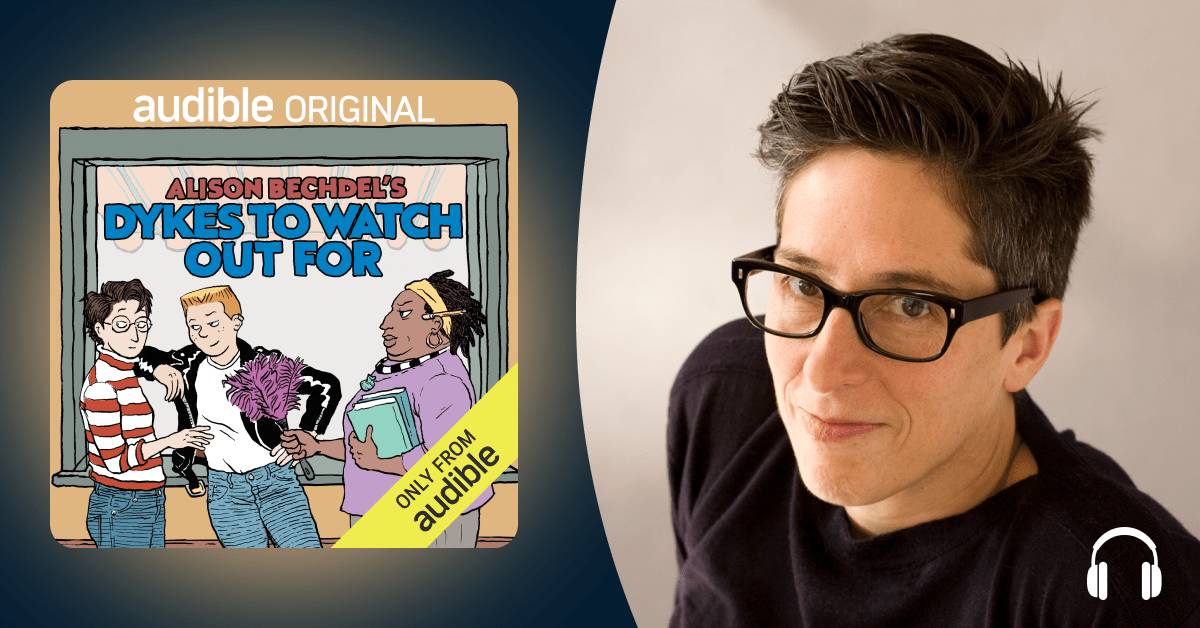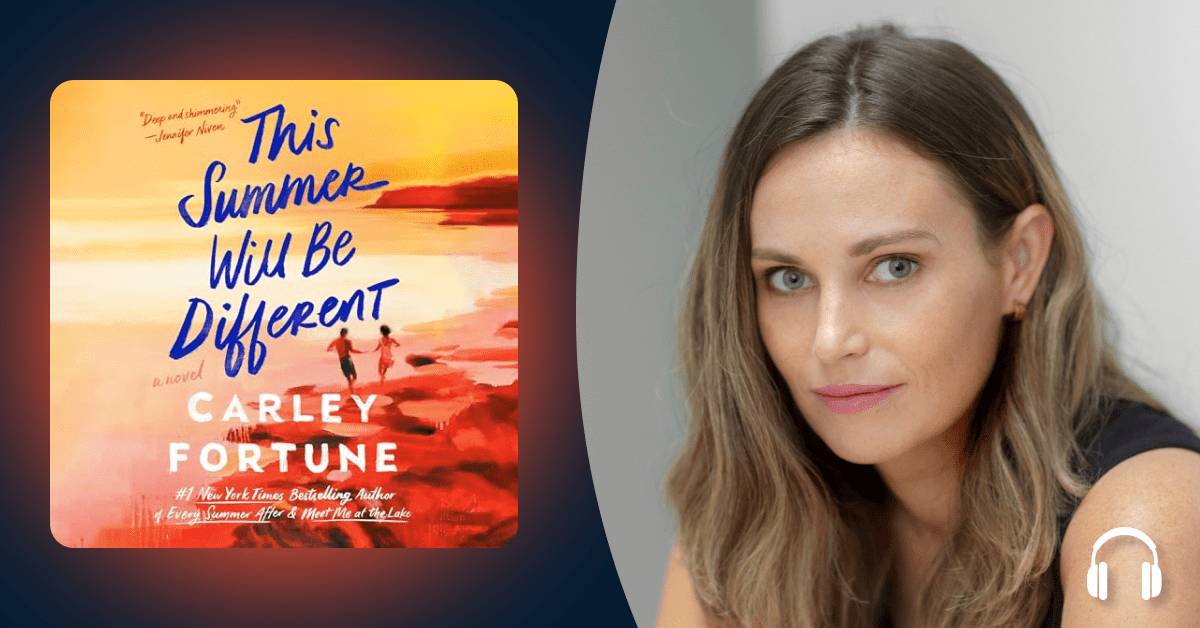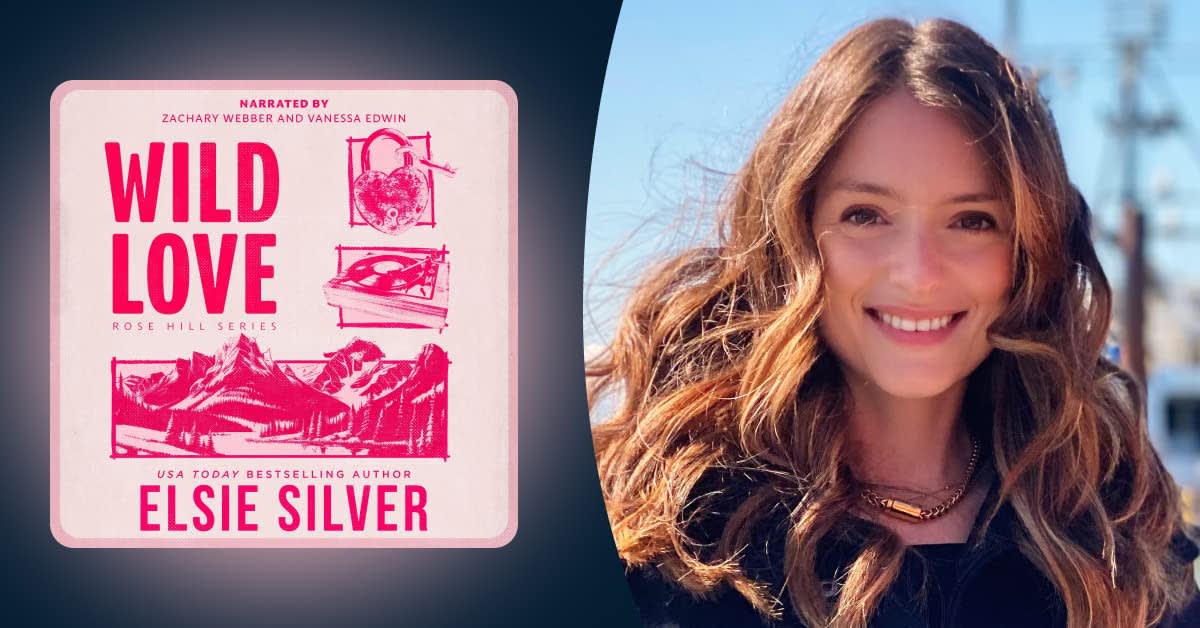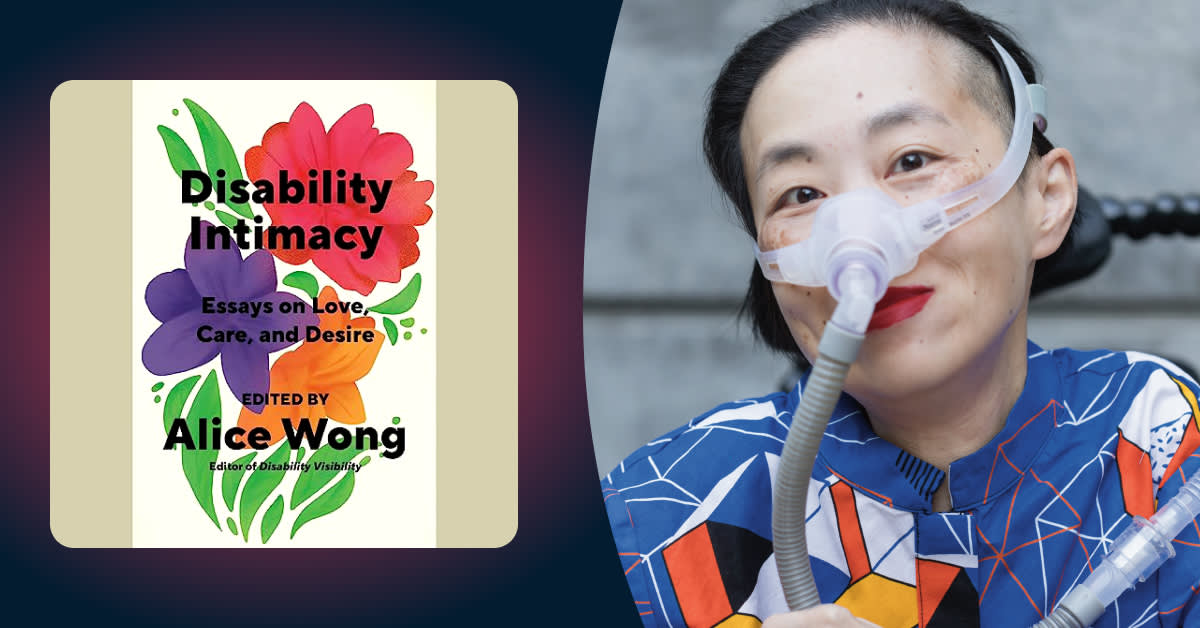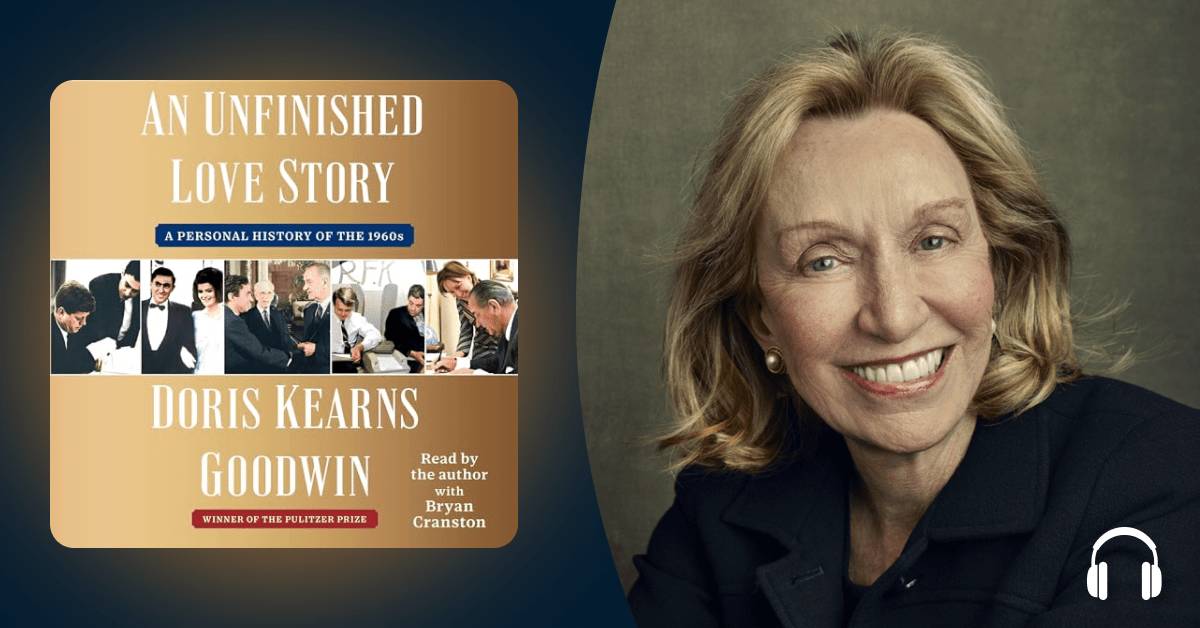GLAAD has teamed up with audio entertainment leader Audible to co-curate and produce the second season of a written interview series featuring LGBTQIA+ talent from the Audible family.
Our third interview features LGBTQ+ icon, Alison Bechdel. Originally known for the long-running comic strip Dykes to Watch Out For, she came to critical and commercial success in 2006 with her graphic memoir Fun Home, which was subsequently adapted as a musical that won a Tony Award for Best Musical in 2015. She is also known for originating the Bechdel test.
Dykes to Watch Out For was a weekly comic strip that ran from 1983 to 2008 and was one of the earliest ongoing representations of lesbians in popular culture. Today, the strip is reimagined with Audible’s audio dramatization featuring LGBTQ+ talent.
Note: Text has been edited and does not match audio exactly.
Anthony Ramos: Alison, let’s get started! We always like to start these conversations with a look back, because I think for so many of us queer people, inspiration often comes from what we see: role models, idols within our community that have helped change the way that we're seen, heard, and represented in society. So always curious if there's someone in the community that has inspired you in your work so far.
Alison Bechdel: Totally. Can I name two people?
AR: You can name as many as you want, absolutely.
AB: A huge influence on me was Howard Cruse who was the editor of Gay Comix. He was an underground cartoonist for a long time, but took this great risk around 1980 of coming out in his work and beginning to edit this gay comic book of work by other gay men and lesbians. And I happened to find that comic book, like, the month after I graduated from college and it was like someone had handed me a blueprint to my life. “Oh my God, I can make cartoons about my life as a lesbian? Sign me up.” Howard was a huge influence and I got to know him later and he was just a wonderful mentor.
But another really important influence was the lesbian photographer JEB, whose work I had just discovered, like, in 1979-1980. And she was going around the country taking pictures of lesbians; she just wanted to see pictures of people who looked like her. And I loved her book of photographs and I felt motivated by that same impulse. I want to see people who look like me and my friends. So, that inspired me to just start creating that reflection myself.
AR: I love that. Thank you for sharing both of those.
We are here upon the release of Dykes to Watch Out For coming to Audible, which is so exciting—thinking of the journey that this project has been on so many years. Thanks to services like Audible, we have so much more access to LGBTQ stories and content. I know I'm always finding new things to listen to that I love that are queer on Audible.
But what would you say is an LGBTQ story that we still need to hear?
AB: I mean, it would be great to see more trans and non-binary stories, more stories by people of color and immigrants and non-US authors. But you know, queer stories are just human stories and a good story is a good story. So, if you have a good story, I wanna hear it.
AR: I love that. Speaking of good stories, did Dykes to Watch Out For start in 1983?
AB: Yes, that was when I first published it.
AR: So, here we are coming up on 40 years.
AB: Creepy!
AR: What an amazing thing to be 40 years in with this amazing project. But now it's coming to Audible, there's a full cast that's going to be attached to this. Tell me what you can about this project because I know so many of us are really looking forward to this new version of Dykes to Watch Out For.
AB: It's so exciting, Anthony, because, you know, I wrote that comic strip alone in my basement for decades. And I would always imagine, “Wow, I wish I could have a sound effect here, or some music here” and now with this Audible version, it's all come to life: there's voices and sound effects and music and it just really brings this other dimension to this work, which is just magical.
"Queer stories are just human stories and a good story is a good story."
AR: Imagine going back to the basement you wrote it in—what was the original intention? Was it really just because you were inspired by that person or was it you wish that there was more of that when you were growing up?
AB: I had always drawn silly pictures as a kid and I sort of wanted to be a cartoonist. And then I realized I could make cartoons about this new experience I was having coming out in the world as a lesbian. It just felt like opening up this whole new world of honesty and directness. You know, I just didn't see a lot of that kind of thing anywhere, whether it was queer or not. I wanted to write real gritty stuff about actual people's everyday lives.
And in the beginning, I was just doing single panel comics like you would see in the New Yorker, just one silly little scene. But it started turning into a story, an ongoing kind of soap opera multi-panel comic strip that would tell an ongoing story episode after episode, year after year. And this whole little world got built, which was really fun to sort of turn myself over to.
AR: I love that. You mentioned being in your basement early on, wishing that there could be a sound effect. And now here we are, there will be sound effects! Tell me about the collaboration process and what it's been like to bring this comic strip into this format where we're literally gonna be able to hear everything.
AB: Well, I have to give huge thanks to Madeleine George who did the writing. She took my comic strips and turned them into, like, a radio play, which was a tricky thing to do. And I'm so impressed that she somehow managed to keep a lot of the language intact, a lot of the dialogue is just directly lifted from the comic strips. A comic strip is a very brief little episode and Madeleine found a way to tie multiple episodes together into these much more satisfying story arcs; she just braided them together and you just get get a glimpse of their lives and it just becomes this world of these bunch of characters. We're hearing from Mo the protagonist one second and then we meet her ex-girlfriend Clarice and Clarice's new partner, Toni, and then to see the actors come in and take this great writing and bring it to life was stunning. That was one of the funnest things I ever did was to get to watch—it all happened on Zoom, of course—and I could see Jane Lynch and Carrie Brownstein and the director Leigh Silverman working on these lines and it was just a trip.
AR: Jane Lynch and Carrie Brownstein—those two names alone, so exciting. Tell me about some of the other actors that we're gonna see bring Dykes to Watch Out For to new life.
AB: Well, Jane Lynch—I mean, can you believe it? She plays the narrator, this narrative voice who holds the whole thing together and she does such great stuff. Mostly she's just the narrator, but sometimes she'll be a sportscaster, like during the softball game, or she'll be a late-night radio personality when there's a romantic sex scene going on. She's remarkable.
Carrie Brownstein does the most amazing Mo. Mo is the central character who was loosely based on me when I started this, you know, 100 years ago. But she just brought this wonderful quality to Mo, she's this sort of Eeyore; this negative yet endearing character.
Roberta Colindrez is awesome. Roberta was in the Broadway musical based on my memoir, Fun Home. She had this wonderful role of my college girlfriend who I came out with and here she is playing Lois, the sort of Casanova “ladies’ lady” character. No one could do this role like Roberta. It's incredible.
AR: This was one of the earlier ongoing representations that we got to see of lesbians in media. What has it been like for you? I would love to hear a little bit about what some of your fans have said to you about what it has meant to see that. And now, they're going to have an opportunity to listen to it.
AB: I did this comic strip for 25 years—I stopped drawing it in 2008, so it hasn't been happening for a while—but it became this project of wanting to document our lives, wanting to archive LGBTQ experience over these decades through the 90’s and the 2000’s because so much was changing. It was a period of tremendous progress that was almost head-spinning. Now it's head spinning in the other direction…
But I was just trying to keep track of what was going on and what it meant as we became more visible and more assimilated in the culture. How do the characters make sense of their lives? And in a way, I would say the reason I stopped doing this strip is because it didn't feel as necessary as it did when I started out. I felt almost obligated to tell these stories as a young person and then it just didn't seem as necessary. There were so many other versions of queer life available to people. So I felt like I could take a rest.
"I was just trying to keep track of what was going on and what it meant as we became more visible and more assimilated in the culture."
But now it's exciting to see it come back in this historic sense. To me, it's always so hard to convey to young people what it was like back in the day. And I don't want to get all “curmudgeonly grandma” but it was different, you know. It was a much more hostile climate that I think is kind of hard for young people to imagine.
So, this takes us back to 1987. Reagan is President. AIDS is happening all around the community and it's a really important historical lesson to immerse ourselves in that moment.
AR: And listen, I think with what is going on in the world right now, it's time we have more of these things and I'm ready for more of Dykes to Watch Out For. I love that with a platform like Audible there's an opportunity for someone that wasn't familiar with the comic strip back in the day kind of get. It's like you're going to have a whole new wave of people following along, which I think is so cool.
AB: Yeah, that's my hope is that a younger audience can discover it! Although I'm always surprised at how many young people are excited about even the old strips. What I hear from them is, “Oh my God, the same things are still going on,” so they're sort of relieved to have this sort of guidebook from these older characters who've been through it.
AR: It's so true. One of my much younger colleagues was so excited about this and I just loved it. It transcends which I think is so great.
Before we wrap up—we talked about the collaboration process but with Audible everything is sound. What do you think about Dykes to Watch Out For lends itself to being an audio production? You mentioned how you wish there could be a sound effect and look—now we have that opportunity.
AB: You know, I wondered about that, I was so, so curious to see how Audible was gonna solve this problem.
Most of the comic strips are dialogue so it's already right there. You've got these diverse characters’ voices playing off one another. It's light and funny, it's all these silly little scenes which come to life easily in an audio format.
The sound effects are such an amazing extra dimension, to hear the bus in the background or the sound of the lesbian vegan cafe. It's just really amazing what you can do with sound.
AR: It really is. I'm so excited about this. Thank you so much for the time, and congratulations. I think it's perfect that you're gonna have a whole new wave of folks—you're gonna also get folks that probably loved it for 25 years and now they're going to get to listen to it. What an opportunity.
AB: Anthony, can I share one funny side note?
AR: I would love that!
AB: One of the episodes happens at a softball game and whoever was doing the sound effects put in the sounds of a crowd watching a baseball game—it sounded like Yankee stadium. And I was like, “Whoa, you guys, no way were there this many people at a lesbian softball game. And there certainly weren't men there.” Because there were all these male voices shouting and cheering. So they had to find some smaller group of people watching softball.
AR: That's hilarious because you're like, “No, I know that that’s not what that actually sounds like.” I love that.
AB: Yeah.
AR: Thank you so much for your time!
AB: Thank you!
